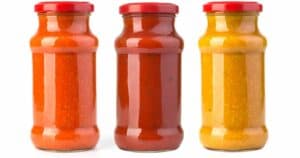Got a killer hot sauce recipe you think could be the next Sriracha? Before you start bottling and labeling your spicy creation, make sure you have the right licenses and permits. Navigating the legal side of selling food products can be daunting for aspiring entrepreneurs.
In this article, we’ll break down the essential permits and regulations for legally selling homemade or commercially produced hot sauce. With the right prep work and paperwork, you can turn your sauce side hustle into a thriving business.
First up, every hot sauce producer needs a basic seller’s permit or resale certificate to collect sales tax from customers. You’ll also likely need a food business license for commercial production, along with a licensed commercial kitchen. For home-based sellers, a cottage food license may suffice depending on your local laws. We’ll explain these permits and help you understand exactly what’s required based on where and how you plan to sell your zesty concoctions.
Selling bottled hot sauce, whether from a storefront, website, farmer’s market or restaurants, comes with health, safety and labeling rules you must follow. We’ll outline the steps so you can legally share your signature sauce while avoiding headaches down the road. Let’s break down the recipe for hot sauce sales success!
Seller’s Permit
The most basic permit required is a seller’s permit (also called a resale certificate or reseller license). This allows you to collect sales tax from customers and remit it to state and local tax authorities1.
Nearly every US business selling tangible goods needs a seller’s permit. You’ll use it when selling hot sauce at markets, stores, restaurants or online. Requirements for obtaining a seller’s permit include:
- Filing an application with your state revenue agency
- Providing business registration docs like articles of incorporation
- Paying a small application fee (varies by state)
- Renewing the permit annually
- Filing regular sales tax returns
Food Business Licenses
If you plan to produce and sell hot sauce commercially beyond cottage food laws (discussed below), you’ll need a food business license2.
This covers businesses that manufacture, process, pack, hold, prepare or store food for sale. Licensing ensures your production methods meet health, safety and sanitation standards.
Specific state or local regulations cover:
- Facility, equipment and utensil requirements
- Food prep, handling and storage procedures
- Personnel hygiene and training
- Water quality and waste disposal
- Food sampling methods
You’ll work with your health department to obtain a food business license. Fees range from $100-$500+ depending on the type of operation. This allows food safety inspectors to conduct audits of your commercial kitchen or facility.
Commercial Kitchen Permit
If you don’t plan to produce hot sauce in your home kitchen, you’ll need to rent or build out a separate licensed commercial kitchen2. Commercial kitchens for hot sauce production must meet stringent requirements including:
- NSF certified cooking equipment
- Triple sink dishwashing area
- Separate food prep and packaging zones
- Sufficient refrigeration and dry storage
- Smooth, non-porous food contact surfaces
- Commercial grade ventilation
- Hand washing stations
- Pest control plan
Local health departments issue commercial kitchen permits after inspecting facilities. You cannot legally manufacture hot sauce for sale without an approved kitchen.
Cottage Food Licensing
Some home-based sellers of low-risk foods can get licensed under Cottage Food Laws, which vary by state2. This allows you to produce certain products in a home kitchen for direct and indirect sales within your state.
Hot sauce is categorized as a cottage food in some states if it has an equilibrium pH of 4.6 or below. This high acidity inhibits bacterial growth. Check your state’s eligible cottage foods list to see if hot sauce qualifies.
Cottage food sellers must take an approved food safety course and label products with contact info and ingredients. Sales are usually capped at $20k-$50k annually. You can sell at markets, retail shops and online within state lines only.
Food Service Establishment Permit
If you want to sell hot sauce at an eatery or food shop you own, you’ll need a food service establishment permit from your local health department2. This covers any place that serves food for immediate consumption onsite or for takeaway.
Your restaurant or deli kitchen must comply with commercial kitchen equipment and food safety standards to obtain a food service permit. These are based on the FDA Food Code and include things like employee health policies, temperature control, sanitation procedures, and pest control.
Regular inspections will check for compliance. Most fees for food service permits range from $100-$500 per year.
Product Labeling & Safety Rules
All commercially sold hot sauces must follow federal and state labeling laws covering3:
- Nutrition facts panel
- Ingredient list
- Net weight
- Manufacturer contact details
- Refrigeration needs
- Lot coding for traceability
Special labeling applies to organic, gluten-free or allergen-free claims. Hot sauces containing citric acid also require batch testing to request a variance from FDA’s acidified foods regulations4.
In addition, facilities producing hot sauce for interstate distribution must comply with the FDA Food Safety Modernization Act (FSMA). This includes having food safety plans and risk-based preventive controls in place5.
Final Tips for Legal Hot Sauce Sales
Selling hot sauce legally requires attention to detail on permits, regulations and labeling. Follow these tips:
- Research all federal, state and local requirements thoroughly.
- Consider LLC formation or incorporation to limit personal liability.
- Maintain meticulous records on kitchen audits and product safety testing.
- Consult a food business lawyer or advisor if unsure about anything.
- Carry adequate business insurance in case of product liability claims.
With the proper prep work, you can turn your hot sauce side hustle into a thriving legal business. Just don’t skip steps when it comes to critical health permits and licenses. Your funnel to hot sauce success depends on it!





